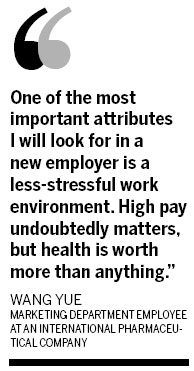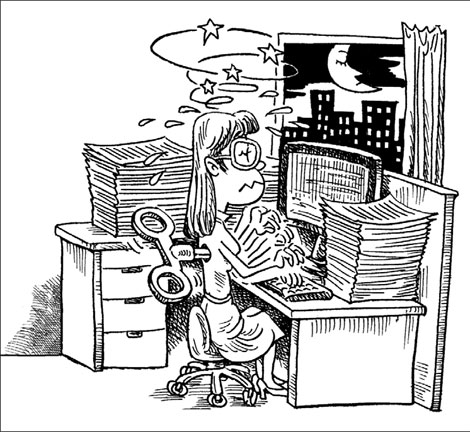Overwork takes its toll on staff health

|
Quite a few white-collar workers in large cities are at risk of work-related stress. The overwork phenomenon is very common in overseas companies in China and it is very hard to change the system in the short term, according to Jennifer Feng, chief human resources expert at online human resources service provider 51job Inc. Fan Jianping / For China Daily |
Many overseas companies blamed for stressful jobs with long hours
BEIJING - Having turned off the office lights at 2 am, Wang Yue wearily trudged home. He and his colleagues spent four days in a row working overtime last week because of an urgent project.
"To be honest, I feel exhausted from overwork. I suffer from various kinds of work-related illness, such as loss of sleep, numbness in the neck and shoulders and neurasthenia (a psychological disorder characterized by chronic fatigue and weakness, loss of memory, and generalized aches and pains)," said Wang, a 29-year-old employee in the marketing department of an international pharmaceutical company in Beijing.
It is true that thousands of millions of Chinese jobseekers dream of landing a well-paid job, like Wang's, with an overseas company. However, the sudden death of a young female worker in mid-April rang loud alarm bells and some of them started to change their minds.
Having been employed in the Shanghai office of PricewaterhouseCoopers (PwC), one of the world's leading accounting firms, for just six month, Pan Jie, a 25-year-old young woman died from acute meningitis. She had just graduated from Shanghai Jiao Tong University with a master's degree last year.
The tragic incident has sparked intense debate over whether working overtime threatens the health of employees, although there is no clear evidence to suggest her death was actually linked to work-related fatigue.
Still, the overwhelming majority of people believed Pan's death was caused by overwork because her micro blog was filled with complaints about working overtime, heavy workloads and her deteriorating health before she died.

"Pan's death really gave me a full-on blow. Now, I am starting to think about changing my job," Wang said.
"One of the most important attributes I will look for in a new employer is a less-stressful work environment. High pay undoubtedly matters, but health is worth more than anything," he said.
More than 70 percent of employees said they suffered from overwork and feel under heavy pressure, according to a recent survey conduced by Beijing-based recruitment website zhaopin.com.
Of some 5,000 Chinese employees polled across the country, nearly 45 percent of respondents said they often felt they were suffering during and after work. Forty percent said they easily lost their tempers at the office.
Another report by the Chinese Medical Doctors' Association and the Chinese Hospital Association showed that around 60 percent of white-collar workers in large cities were at risk of work-related stress.
Jennifer Feng, chief human resources expert at online human resources service provider 51job Inc, pointed out that the overwork phenomenon is very common in overseas companies in China and it is very hard to change the system in the short term.
While most university graduates are aware of this situation, they still apply in vast numbers to those companies because of the relatively high starting salary, she said.
According to employees at the big four accounting firms, PwC, KPMG, Ernst & Young and Deloitte Touche Tohmatsu Limited, a newly-recruited university graduate can expect to earn 5,000 yuan ($769) to 6,000 yuan a month. Their monthly salaries can often double or triple after a few years,
Many big four workers admit that their companies are known for paying well, but they are also notorious for overworking employees at the same time.
"Working overtime is normal at the big four. It's like a culture," said a junior auditor at Ernst & Young, who declined to be identified.
"They will give you a project and set a deadline, but it's impossible to finish it without working overtime," she said.
In order to finish her projects, she usually works at least 20 extra hours every week. January to April is the busiest period for the company, and during that time she often works until midnight and has only one day or even a half-day off a week.
"Taxis queue up for us in front of our office building at midnight," she said.
Experts said both employers and employees should attach great importance to the adverse effect that overwork brings.
Companies should hire more workers to share the heavy workload rather than hire inadequate numbers in order to reduce labor costs and force them to overwork, said Feng at 51job Inc.
"Employees, especially those born after the start of the 1980s, often lack the ability to take care of themselves. If any physical or mental problem occurs during work, they should take it seriously," she said.
Tang Ningyu, professor of the School of Management at Shanghai Jiao Tong University, said employers should make a great effort to help their employees to strike a proper balance between work and home.
"Companies should ensure better employee welfare, provide regular health examinations and force employees to take holidays," said Tang.
If employees achieve a better work-life balance, it will have a positive effect not only on the individual career paths but also on the development of companies, she added.
Li Wen, a Beijing lawyer, said labor unions could play a role in protecting employees from overwork.
But the fact is that, currently, many Chinese offices of international companies, including the big four, do not have labor unions, said Li.
China Daily
(China Daily 05/30/2011 page17)















